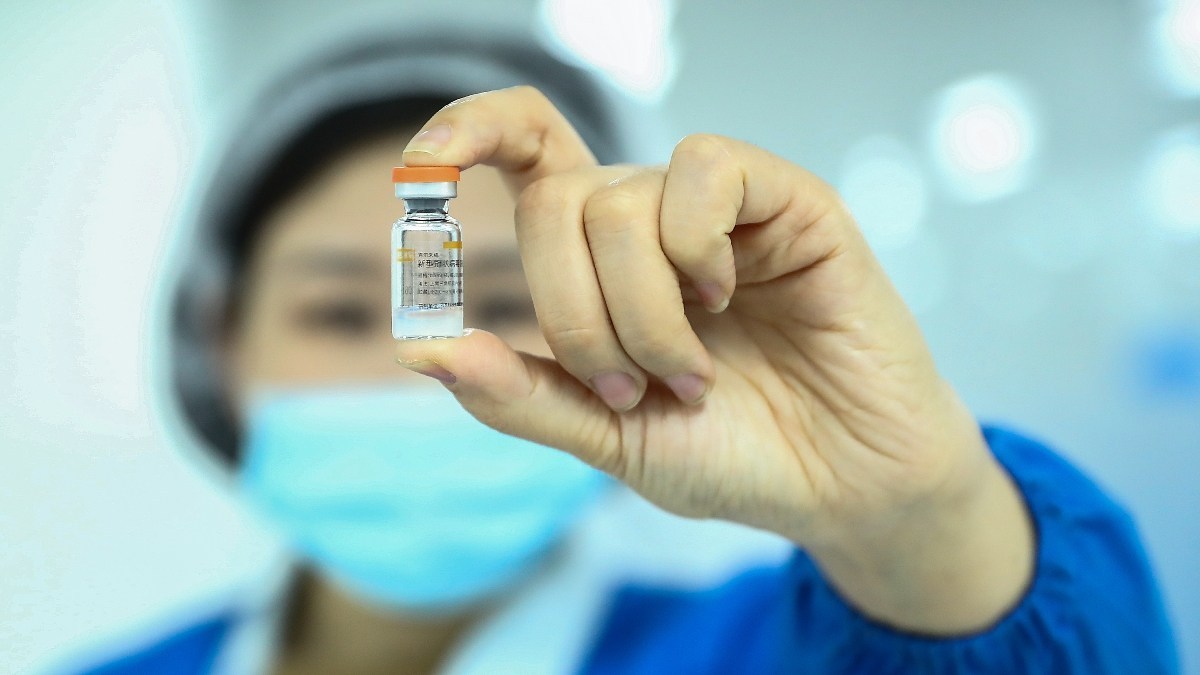[ad_1]
China and the Quadrilateral Security Dialogue countries, which include the United States, Japan, Australia and India, have stepped their efforts in “vaccine diplomacy†battle by providing low-cost jabs and travel convenience to other countries.
China’s Office of the Commissioner of the Ministry of Foreign Affairs in Hong Kong announced on March 12 that foreigners, who had received mainland vaccines two weeks earlier, need not present negative Covid test certificates and 14-day travel and health declaration forms when they applied for work, business and family visit visas for visiting the mainland. The new rule took effect on Monday.
Chinese embassies in other countries, including Pakistan, Nigeria, Afghanistan, the Philippines, Sri Lanka, Israel and Thailand, announced the same rule on Monday and Tuesday. Australia, Germany and the US also saw the same announcement on their Chinese embassies’ websites though they have not yet approved Chinese vaccines within their territories.
Zhao Lijian, spokersperson of China’s Foreign Ministry, said Monday that manufacturers of non-Chinese vaccines had to apply to the Chinese government’s health departments if they wanted those who used their products to enjoy the recently launched travel convenience.
Currently, the two major mainland vaccines are developed and manufactured by Sinovac and Sinopharm while the western vaccines are made by BioNTech, Astrazeneca and Johnson&Johnson.
China’s statement came after US President Joe Biden announced a vaccine partnership with the US, India, Japan and Australia at the outset of the first leaders’ summit of the Quad. Under the plan, the countries will finance, manufacture and distribute at least a billion vaccine doses to developing countries by the end of 2022.
The vaccine diplomacy fight is seen as a curtain-raiser for a high-level meeting between Chinese and the US officials in Alaska on Thursday.
Curbing China
On Sunday, the Global Times, a mouthpiece of the Communist Party of China, said in an article that the Quad’s vaccine plan would fail in the end. Citing two Chinese academics, the article said the Quad countries would consume most of the one billion doses and provide only the leftovers to other countries in Asia. It also said it was unlikely that the US drug firms would transfer their vaccine technology to India.
The article said China would continue to supply vaccines to other countries but had no intention to compete with India in so-called vaccine diplomacy. It said it was disappointing that the Quad used vaccine cooperation as a political means to curb China.Â
Two commentaries written by unnamed bloggers were widely circulated by China’s military websites last Saturday. One said India would not have received a big vaccine manufacturing order from other Quad countries if China did not have a rising influence in the Asia region. Another article said China had already won the trust of many other countries in the pandemic fight while the Quad’s vaccine plan was late, ineffective and hypocritical.
On March 7, Foreign Minister Wang Yi said China had distributed its jabs to 69 developing countries for free and would export the mainland vaccines to 43 countries. Wang said China had received a lot of orders and praise from all over the world.
Heng He, a political commentator and an expert in pathophysiology and immunology, said there was no doubt that China had made achievements in its vaccine diplomacy in situation in which that many developing countries had failed to get any vaccine.
Heng said the Quad’s move to fight back was quick, compared with its slower reaction to prevent China’s 5G technology from dominating global markets in the past two years.
Heng said the Biden administration could make such a quick move as the Trump administration had improved the US China policy. Heng said the Quad’s vaccine plan would help support the US geopolitical game plan in Asia.
Fan Shih-ping, a professor at the National Taiwan Normal University’s Center for China Studies, said China tried to give its vaccines to some developed countries for free and then use their names to build up the brand for its jabs. Fan said China was eyeing long-term income by exporting its vaccines.
On March 11, International Olympic Committee (IOC) President Thomas Bach said China had agreed to provide Covid vaccines for the participants ahead of this summer’s Tokyo Olympics and next year’s Beijing Winter Games.
On March 12, Olympic Minister Tamayo Marukawa said Japan had not been consulted by the IOC about the Chinese vaccines. Japan and Australia said their athletes would not take them.
Seven deaths
Meanwhile, the vaccination program in Hong Kong received a good response from the public on Tuesday after the government lowered the minimum age requirement from 60 to 30. Students over 16 and studying outside Hong Kong and domestic helpers are also given priority.
Some vaccination centers and public clinics were fully booked for the next two weeks despite lingering concerns about the jabs. As of Monday, seven people had died after they were injected with the Sinovac vaccine. However, the government’s advisory panel on vaccinations said none of the deaths could be linked directly to the jab.
Preliminary investigations found a number of the patients had blocked heart blood vessels which led to their deaths, said Ivan Hung, a member of the advisory panel. He added that heart problems are common in Hong Kong, and kill an average of 16.7 people per day.
The Center for Health Protection said a total of 18 cases, including five imported ones and 13 local infections, were recorded on Monday. More than half of the local cases were found in Mid-Levels and in Western, where a gym was hit by a coronavirus outbreak recently.
[ad_2]
Source link













